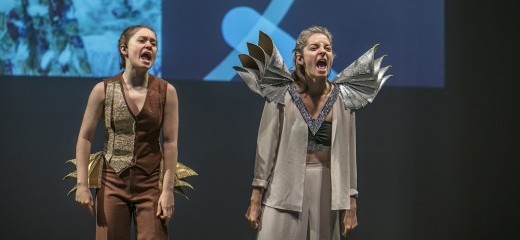
I love her: Chelsea & Magda
by Lauren Samblanet
For every action there is an opposite but equal reaction.
For every shame, there is a pleasure.
But in The Shame Symposium, by duo Chelsea and Magda (Chelsea Murphy and Magda San Milan), an imbalance occurs: for each humorous moment, there is a not a serious moment. The seating at FringeArts has been reduced, with the back half of the house blocked out by a hanging curtain. The show is almost sold out, and this, combined with the fewer seats, makes me feel a bit claustrophobic.
Chelsea and Magda announce to us in the first few minutes of the performance, “We love this piece because it’s hilarious.” But how much does humor aid in our understanding of a performance? Can too much humor distract us from that understanding? Their declaration makes me defiant – I will not laugh at Chelsea and Magda – perhaps internally, but I certainly will not laugh out loud.
The audience, unlike me, laughs out loud frequently. They laugh at moments that are certainly hilarious, and they laugh at moments that make me wonder what they see that I don’t. What would this performance have been like if the audience never laughed out loud? – if Chelsea and Magda had not told me this was going to be hilarious? I wonder if the audience feels forced to laugh, because for Chelsea and Magda applause is not the desired “thank you,” but rather the laughter is.
But if I laugh, and if I focus solely on the humor, then I might miss those tender moments when Chelsea and Magda, dressed up like rave-girls, color in a giant coloring book full of vaginas, and lie in a bed made of inflatable rafts, legs tangled together, reminding me of my childhood and the closeness I shared with my girlfriends, who are so far away from me now. I might miss the language in the “I love her notebook” (a video of a notebook with quotes and stickers), which reminds me of how much shame our culture has given me about being “girly,” about being a girl. How soothing it is to see Magda’s hands flipping the pages on the screen and tracing the stickers on the notebook pages—there is such care in her movements.
As I focus on the care of Magda’s hands in the video, Chelsea and Magda, dressed in over-the-top pink and blue outfits, move across the stage in a way that asks for us to laugh. They wear colorful wigs and bracelets and accumulate more clothing each time they exit and then re-enter the stage. Chelsea pulls a beanie baby dragon on a leash behind her. Their movements are exaggerated—like go-go dancers, but somehow spastic, like children. The audience is laughing hard. Perhaps I’m the one who is missing the point, but as Chelsea and Magda dance, I want to tell the audience to pay more attention to the “I love her notebook,” to its jarring language about being a girl. I want us to be silent for a moment, for Chelsea and Magda to sit still, for us to feel the weight of shame.
Rather than stillness, there are shame solos. Shame teachings. Shame duets. There is a Prezi presentation. There is an audience participation moment that is absurdist and acts as filler while Chelsea and Magda change; like audience participation usually does, it makes me cringe. There is grinding and wiggling. There are intense bodily collisions; there is a fight. Chelsea and Magda yell. They stick out their tongues and gnash their teeth. They talk in voices that sound like little girls, like ditzy blondes. They shake and sigh. They lazily dance ballet. They spin. They sing. But never do they sit still, not until the last few moments. And during all of this, there is audience laughter, never that silence that seems to imply understanding.
Leaving the theater, I feel disappointed. Was my defiant non-laughter distracting me from the meaning? Had the meaning I found in the “I love her notebook” and during the inflatable bed scene been false? Does The Shame Symposium simply want us to laugh at our own shames, at the shames of the performers? Do my desires for what I wanted to get out of The Shame Symposium matter?
In the stillness of my home, I think about the performance. I keep seeing Chelsea and Magda’s legs tangled together on the inflatable bed, only one of Chelsea’s light-up shoes lit up. The sweetness of sharing ourselves with our girlfriends, the curiosity we had as children, the way we loved each other so much that we never judged each other, not even for the most shameful of acts. I wish I could have had more stillness, more silence, to arrive at meaning during the performance.
The Shame Symposium, Chelsea & Magda, June 9-11, FringeArts
By Lauren Samblanet
June 12, 2016








